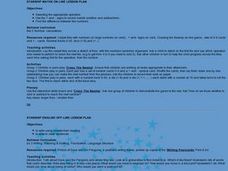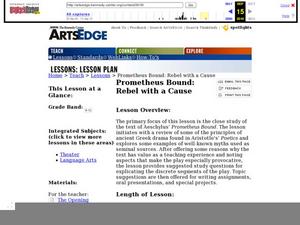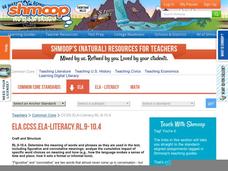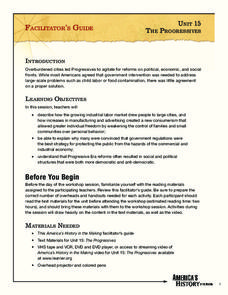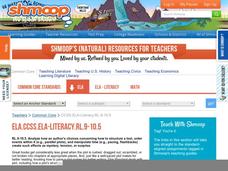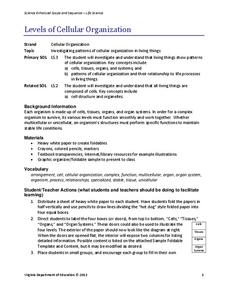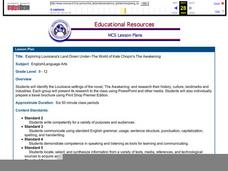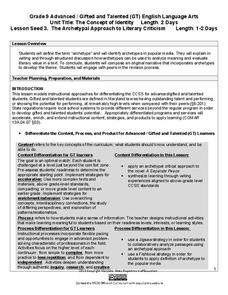Maine Content Literacy Project
Introduction to The Lottery, by Shirley Jackson
"The Lottery" by Shirley Jackson is a great story to share with your class, and this lesson focuses on just that story! The eighth in a fourteen-lesson series on short stories, the plan has learners study some vocabulary, read the story,...
Star Wars in the Classroom
"Shakespeare and Star Wars": Lesson Plan Day 6
How can a screenplay create meaning and drama in ways that other forms of writing cannot? That is the question class members must answer as they compare the cantina scene of the screenplay for George Lucas's Star Wars: A New Hope with...
Maine Content Literacy Project
Introduction to Ernest Hemingway
What is a white elephant, and what does it have to do with Ernest Hemingway? Study "Hills Like White Elephants" in-depth by following the procedures outlined in this lesson, the fifth in a series of fourteen. Learners start the day with...
Channel Islands Film
Santa Cruz Island Restoration Narrative
What would you be willing to do to save an animal from extinction? After re-viewing a video about the restoration of the Island Fox on Santa Cruz Island, individuals adopt the point of view of one of the key players in the debate and...
EngageNY
TASC Transition Curriculum: Workshop 15
What do a cheetah, Audi commercial, and air have in common? They're all topics of an engaging inquiry-based, hands-on workshop for educators about background knowledge, reading strategies, the CER model, and argumentative writing. The...
University of Minnesota
Sheep Brain Dissection
Bored with frog and earthworm dissections? Had your fill of fetal pigs? Anatomy young scholars will be intrigued by the sheep's brain, and you will be prepared with guiding questions, extension activities, and pictures as they dissect...
Curated OER
Constructing Narrative from the Migrant Experience in Literature
Excerpts from John Steinbeck's The Grapes of Wrath and from John Fante's Ask the Dust, as well as a variety of primary source documents provide the background for an examination of the migrant experience from 1920-1945.
Maine Content Literacy Project
Introduction to John Updike
Expand your pupils' understanding of the short story genre with a study of John Updike and his story "A&P." This lesson plan, the fourth in a series of fourteen, invites learners to examine literary terms and read and discuss the...
Maine Content Literacy Project
Introduction to the Short Story
How should pupils read short stories? Set them up for this unit with an introductory instructional activity that goes over the main characteristics of a short story and starts learners off reading their first short story of the unit. In...
BBC
Starship English and Math - Online Lesson Plans
Two online lessons, one in math and one in language arts, are here for you. In them, learners play online games which reinforce important skills in literacy and numeracy. The thing I like about both of these lessons is that they get the...
Curated OER
Prometheus Bound: Rebel with a Cause
If you are teaching Aeschylus' Prometheus Bound, you can't afford to miss this source. An extensive list of ideas outlines numerous discussion topics, writing prompts, comprehension questions, oral presentations, and projects. Have class...
Shmoop
ELA.CCSS.ELA-Literacy.RL.9-10.4
The fourth standard for reading literature in the Common Core calls for young readers to be able to determine the figurative and connotative meanings of words and phrases. Use this resource, a continuation of a series of Common Core...
Maine Content Literacy Project
Introduction to Short Story Writers Say
There are so many authors of short stories, and your class can have the chance to study quite a few. This seventh lesson in a series of fourteen continues the decision-making process for the final assessment: a short story author study....
Channel Islands Film
Island Rotation: Lesson Plan 2
Why are Torrey pines only found in La Jolla, California and on Santa Rosa Island? Class members examine images of Torrey pines from these two locations, noting the similarities and differences, and then develop a demonstration model that...
National History Day
Challenging the Status Quo: Women in the World War I Military
Why are some so resistant to change? The status quo is often to blame for a lack of forward movement in society. Following the events of World War I, women in America suddenly had a voice—and were going to use it. Scholars use the second...
Annenberg Foundation
The Progressives
The Progressive Era brought about a word that often leads to turmoil—change! Learners research the late 1800s in American history to uncover societal issues gripping the nation back in the day. The 15th lesson of a 22-part series...
Annenberg Foundation
Global America
It's not really a small world after all! The 21st lesson of a 22-part series on American history researches the impact of globalization on the United States. Using photographic and written references materials, as well as video sources,...
Shmoop
ELA.CCSS.ELA-Literacy.RL.9-10.5
Your students already know when they like a story and when they don't, but they may not know that the plots of these stories are shaping that opinion. Like all resources in this series, the two activities and quizzes provided here deal...
Micron Technology Foundation
Inventions and Patents
Curiosity gets you everything. With this assignment, inspiring minds come together to create and invent. Learn how and why we invent and what it means to patent an invention.
Novelinks
Tuck Everlasting: Bio-Poem
Learn about the characters of Natalie Babbitt's Tuck Everlasting with a character biopoem. Readers fill in a poem format to detail the character traits of Winnie, Jesse, Miles, and Mae, and share their finished poems with their peers.
Virginia Department of Education
Levels of Cellular Organization
What an eccentric way to learn about each level of cellular organization! Allow emerging biologists to utilize white paper and create their own foldable charts to describe each level of organization in the body. You may also adapt the...
Curated OER
Exploring Louisiana's Land Down Under - The World of Kate Chopin's The Awakening.
Visit 19th century Grand Isle, Cheniere Caminada, and New Orleans! Meet the inhabitants, learn about their history and culture, and view landmarks and industries! After reading Kate Chopin’s The Awakening, class groups research the...
Curated OER
Nureyev: After Petipa
Incorporating the arts into regular classroom practices isn't an easy task. Learners will research background information regarding Russian culture, history, and conflict then see how those things have applied to the rigors of Russian...
Maryland Department of Education
The Concept of Identity Lesson 3: The Archetypal Approach to Literary Criticism
As class members continue their study of approaches to literary criticism, readers examine the symbolism and archetypal patterns in John Knowles' A Separate Peace, and how these parallels are used to develop a theme in the story.











